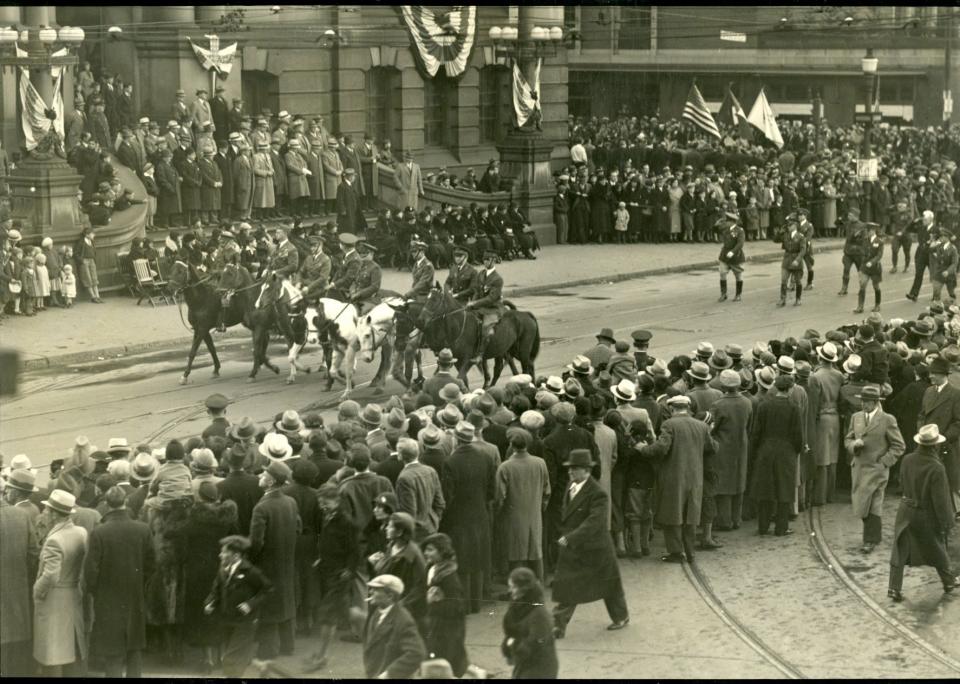Veterans Day thoughts: 'Thank you for your sacrifice'
If you have put yourselves in harm's way for our great country, thank you for your service! And heartfelt thanks also to friends and family who have supported you.
In 1962, President John F. Kennedy addressed members of the First Armored Division at Fort Stewart, Georgia. “Many years ago, there was found in a sentry box in Gibraltar a poem which said:
God and the soldier, all men adore
In times of danger and not before
When the danger is passed and all things righted,
God is forgotten and the soldier slighted.
This country does not forget God or the soldier. Upon both we now depend. Thank you.”
To me, that accurately represents the purpose of Veterans Day. It is a reminder that freedom is not free; it is a forced pause in our busy lives to recognize and thank our servicemen and women who put on a uniform to defend freedom and our democratic way of life.
Former Chief of Staff of the Army and Supreme Allied Commander, Europe, Gen. Bernard W. Rogers received the George C. Marshall Medal in 1999. He made a very interesting point about the unique nature of military service in our society.
“A doctor contributes to his patients; a priest to the members of his parish; a lawyer contributes to his clients; a politician to his constituents. But those privileged to wear our nation's uniforms belong to a profession in which every member, every day, makes a contribution − no matter how small − to every citizen of this great land.”
Veterans Day originated as “Armistice Day” on Nov. 11, 1919, the first anniversary of the end of World War I. Congress passed a resolution in 1926 for an annual observance, and Nov. 11 became a national holiday in 1938.

On June 1, 1954, Congress changed the name from Armistice Day to Veterans Day, shifting the emphasis from commemoration of the end of World War I in favor of honoring all veterans from all American wars.
Should you say 'happy Veterans Day' to veterans?
This leads me to another point. Is it just me, or are any of you other veterans, especially combat veterans, a bit discomfited by the greeting, “Happy Veterans Day”?
I understand people who utter those words or send those emails genuinely wish us well on a day set aside to recognize our service.
But still.
For many veterans, especially those who were not career military, their service was not a happy experience. Some are happy, I guess, that they survived it, and made it back home to family, friends and a future. While the experience may have strengthened them, “happy” is probably not the first word they would use to describe their time in the military.
Who says “Happy Memorial Day”? And, before 1954, I daresay not many folks greeted each other on Nov. 11 with “Happy Armistice Day.”
Mike Fink captured this sentiment in an opinion piece published in The Providence Journal last year. He reminded us that our popular and uplifting Civil War song “When Johnny Comes Marching Home” has a much sadder and darker Irish version, sung to the same music, entitled “Johnny I Hardly Knew Ya.”
Both songs surfaced at about the same time, and debate continues as to which came first.
“Get this,” Fink wrote. “[The Irish] version of the song was not a pleasant ballad popularized by the charming Andrews Sisters. It was a dirge sung … to a cripple …”
It is viewed as one of the most powerful anti-war songs of all time.
But we prefer the happy version and the cheerful greeting.
Bottom line: Veterans Day should be a day of reflection, a day of gratitude and even a day of condolence.
As Ed Duffy wrote in a Providence Journal op-ed last year, “When we serve … we do our duty. We do not pick our war.”
Speaking of the ubiquitous "Thank you for your service!" greeting (yes, the same greeting I used above), he writes: “We endured months, and sometimes years, of separation from family and friends. Many of us came back injured and scarred. Many did not come back at all. We all sacrificed.
“So perhaps a better recognition to us would be, ‘Thank you for your sacrifice.’ ”
This article originally appeared on The Providence Journal: Happy Veterans Day? Instead Try: 'Thank you for your sacrifice'

